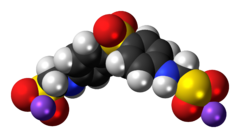Sulfoxone
Appearance
 | |
 | |
| Clinical data | |
|---|---|
| Routes of administration | Oral |
| ATC code | |
| Pharmacokinetic data | |
| Protein binding | 69% |
| Metabolism | Hepatic |
| Elimination half-life | 3 to 8 hours |
| Identifiers | |
| |
| CAS Number | |
| PubChem CID | |
| DrugBank | |
| ChemSpider | |
| UNII | |
| KEGG | |
| ChEMBL | |
| CompTox Dashboard (EPA) | |
| Chemical and physical data | |
| Formula | C14H16N2Na2O6S3 |
| Molar mass | 450.45 g·mol−1 |
| 3D model (JSmol) | |
| |
| |
| | |
Sulfoxone or aldesulfone sodium is an anti-leprosy drug.[1] It is also known as diasone. Sulfoxone sodium was introduced in Japan in 1948.[2] Ernest Muir introduced it to Western use while serving as superintendent of the Chacachacare Leprosarium on Trinidad in the Caribbean.[3]
References
- ^ "Sulfoxone".
- ^ Ozawa H, Maruyama Y (2002). "[A 50-year history of new drugs in Japan: the developments of antileprosy drugs and their epidemiological aspects]". Yakushigaku Zasshi. 37 (1): 76–83. PMID 12412600.
- ^ Browne, Stanley George (1974), "Ernest Muir, C.M.G., C.I.E., M.D. (Edin.), F.R.C.S., LL.D. 1880–1974" (PDF), International Journal of Leprosy, vol. 42, no. 4, Bauru: International Leprosy Association, pp. 457–458.
